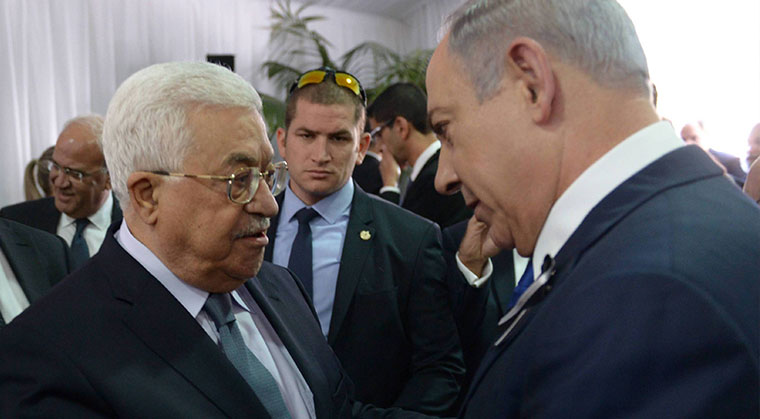
REPEAT PERFORMANCE Tzipi Livni thinks we will see these two men shaking hands again. In an exclusive discussion Mishpacha learns why
T zipi Livni has been a mainstay of Israeli politics for the last 16 years. Once at the top of the now-defunct Kadima party and a former member of Likud Livni is now chairman of the Tenuah Party and a member of the Zionist Union the main opposition party to Binyamin Netanyahu’s Likud. Livni who was in Washington this week to participate in the annual American Jewish Committee Global Forum spoke to Mishpacha about the Trump administration and Israel and the chance for peace with the Palestinians
President Trump is showing he wants to actively engage in the peace process. Do you think he will succeed?
I hope so. Trump made it clear that he wants to reach a “deal.” When he says “deal” he means a permanent status agreement. All the conditions are there today to make it happen. The Arab region wants to normalize relations with Israel firstly because of Iran and because of other issues in the region. The Palestinians have lowered their demands and there is an American president to whom no one wants to say no. But the coalition in Israel has components with opposing views and therefore the decision is at the doorstep of the prime minister.
Why is there reason to be optimistic when you look at the Palestinians and their behavior in earlier rounds of peace talks?
They deserve to be criticized as well. They have not made the decisions that needed to be made. In 2014 they did not give an answer to President Obama and in my eyes that was a historic missed opportunity because Netanyahu was in a place where he agreed to take significant steps on core issues. If Abu Mazen would have said yes we would have been in a totally different place today. The concept that can work is that the Americans place on the table a few basic principles on core issues and call the sides to negotiations. Why do I think that the sides won’t repeat the mistakes of the past? There is an American president who wants a deal and has declared Abu Mazen a partner. It will be very hard — after the American president invests his efforts and calls him a partner — for Abu Mazen to run away.
He’s done it before. Why should we expect he won’t do it again?
The Palestinians understand that with everything happening today in the world they are no longer the center of attention. With Europe under a terror threat the situation whereby in the past they would go to Europe when they didn’t get what they wanted from Israel is over. The Arab world is busy with its own issues. This may be the final opportunity to reach a two-state solution.
I hope at least that they will not want to go head to head with the administration because if they refuse there can be far more dramatic consequences with regard to American funding in the way they are treated and on other subjects. Therefore because Trump got into the issue and was attentive to their needs it seems to me that it will be hard for them to run away.
You mentioned that you believe Abu Mazen is a partner. Wouldn’t Israel be better served waiting for new younger Palestinian leadership not brought up under the Fatah’s revolutionary banner?
We do not determine who is who on the Palestinian side. The question of whether he is a partner or not is dependent on the decisions he makes not on what I will say or what [Defense Minister Avigdor Lieberman] will say or what Netanyahu will say.
What about Abu Mazen’s ongoing incitement?
He has proved himself with one basic thing: the understanding of cooperation on security matters against terror. And in that he believes in a political process. One thing is clear to anyone who is involved: The day after Abu Mazen nothing good looms ahead. The unknown is not good news. It is a pendulum that swings from Hamas to chaos from the Palestinian Authority coming apart or coalescing around a new leadership that will replace Abu Mazen.
Why not wait for that to happen?
Those who want to wait don’t say let’s not do anything during the waiting period. They want to continue building in isolated settlements and do things that will only make it more difficult for us to reach an agreement. Instead of being busy with the question of whether there is a partner Israel needs to decide what it wants. Do we want one state or two states? If two states how do we preserve the settlement blocs? How do we make sure that a Palestinian state is demilitarized?
There is a group whose interest is building in isolated settlements to reach a situation where we won’t divide the land. Defense experts have already established that the settlements don’t contribute to security they only threaten security. For those who want Eretz Yisrael Hashleimah I respect them for their ideology but say the truth: that you want to prevent an agreement. [Our camp] will say that we believe in a Jewish and democratic Israel and in dividing the land and we will decide about it. Then we will see what happens about the partner and if it’s possible or not. (Originally featured in Mishpacha Issue 663)


